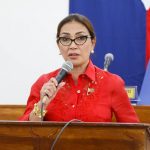Presidential aspirant Ferdinand “Bongbong” Marcos, Jr. and vice presidential bet Davao City Mayor Sara Duterte will prioritize digital infrastructure to further strengthen and improve internet speed in the country when they win in the 2022 elections.
The BBM-Sara tandem, dubbed Uniteam, for their common belief in advocating unifying leadership, emphasized the importance of having a strong digital infrastructure to be incorporated in the government’s “commendable” Build, Build, Build program to ensure that the people have access to affordable and reliable internet.
The duo said the problem of slow internet connection in the country was highlighted at the height of the pandemic when teachers and students experienced tough challenges in conducting online classes.
The Uniteam added that the government’s action in solving the problems and identifying the reasons why the country is still lagging behind in internet speed as compared to other countries should be quick and decisive
A recent study by the National Research Council of the Philippines (NRCP) shows that more than 90 percent of teachers from elementary, junior high school and senior high school are struggling with internet connectivity in several regions, especially in rural areas.
At least 71.87 percent of the 28,859 teachers surveyed said they use mobile data to connect to the internet, 32.50 percent use fiber internet, 10.38 percent use DSL and 20.61 percent use portable Wifi devices.
Even Education Secretary Leonor Briones admitted during a press conference last August that stable internet connectivity is a continuing challenge for teachers nationwide.
Marcos earlier urged the National Telecommunications Commission (NTC) to audit the performance of all telecommunications firms to assess the quality of internet service in the country.
The Department of Information and Communications Technology (DICT) recently said that the average download speeds for fixed broadband reached 71.17 megabits per second (Mbps) in July versus 66.55 Mbps the previous month.
Meanwhile, mobile internet download speed saw a slight uptick from 32.84 Mbps in June to 33.6 Mbps in July.
The DICT added these improvements put the country at 63rd out of 180 countries for fixed broadband and 72nd out of 139 countries for mobile internet.
“While it is good to see our internet download speeds improve, the experience of teachers and students show it does not necessarily translate to better overall user experience. It is high time for Telcos to focus on improving parameters such as coverage and stability of connection, which impacts on day to day use,” the Uniteam stated.







